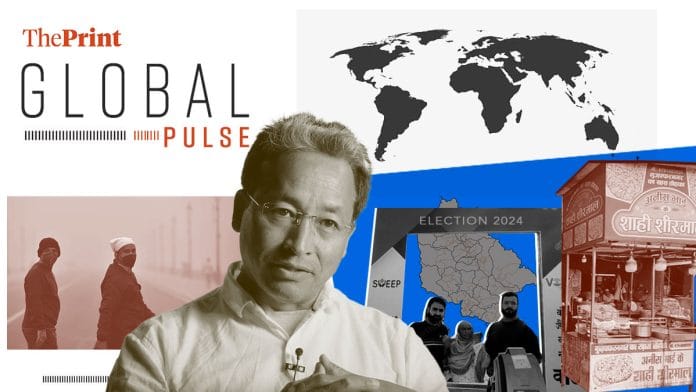New Delhi: The Kashmir election has made one thing clear—it rejects the BJP, writes former Pakistani diplomat Maleeha Lodhi in Dawn.
The BJP’s 2019 abrogation of Article 370 is the backdrop of the recent electoral outcome and has to be seen as such. The decade-delayed elections were peaceful, but only because of the “coercive presence” of half a million Indian troops, writes Lodhi. Leaders of the All Parties Hurriyat Conference were in jail or under house arrest, and media and foreign journalists were restricted in their reporting. All this was accompanied by the central government’s recent move to increase the powers of the lieutenant general, now the true custodian of power in the valley—a move condemned by Kashmir’s political leaders across the spectrum as degrading the office of the chief minister to a “powerless rubber stamp.”
“The election result was a reaction to these moves and above all to the state’s truncation and disempowerment. Significantly, there were no boycott calls. This reflected the public’s eagerness to use the ballot box to vent their protest against New Delhi as an act of resistance, especially as the election was seen as a referendum on the BJP government’s policies,” writes Lodhi.
The National Conference was able to harness popular anger against New Delhi, which paid off. Independent candidates were unable to hold their own. And the electoral results underline a clear Hindi-Muslim divide in the region, according to Lodhi.
“What is apparent is that BJP’s hopes that the election would end the debate over J&K’s status and enable Modi to ‘legitimise’ his 2019 action have been dashed,” she writes. “In any case, an election under Indian occupation cannot serve as a substitute for a genuine exercise in self-determination by the Kashmiri people. Nor does the election alter in any way J&K’s disputed nature, embodied in UNSC resolutions. What the election does show is that whenever given a chance to voice their opinion the people of Kashmir always say they want no truck with New Delhi.”
The politics of Kashmir have always been dynamic, its local issues far removed from problems the rest of the average Indian public faces. The New York Times reports on a point of tension in the region: this time, Ladakh.
Focusing on Sonam Wangchuk’s protest march to Delhi—and his ongoing 28-day hunger strike, also his fourth for the cause—the story looks at his ongoing movement for autonomy in Ladakh, and how new developments like rampant construction and the sale of mining rights are affecting the local environment.
Ladakh’s strategic location complicates matters. “Ladakhis have sought a number of remedies from the government, foremost of which is a provision in the Constitution granting the region the right to set its own rules on matters like agriculture and forestry,” the NYT reports, quoting Wangchuk’s demand for Ladakhis to be involved in shaping the policies that affect them.
“Ladakh is like Mars, which is not easy to understand,” said Wangchuk in an interview.
Wangchuk’s protest to raise awareness on important ecological concerns could fall on deaf ears in Delhi, which is preparing to become a gas chamber during Diwali as usual.
The Economist reports on how this battle with pollution has become literal—what with anti-smog guns being deployed across the capital to fight the fog and the filthy air. They point out a new Yale-led study using randomised controlled trials that have determined that emissions-trading schemes to cut pollution actually seem to have worked in India.
Plants that have taken part in the trading scheme—like one being championed in Surat by the Gujarat Pollution Control Board—have emitted “20-30% less” than those that haven’t.
“The market is more efficient,” the story claims—it’s cheaper for bigger firms to just buy permits than to invest in reducing emissions. “The findings are especially encouraging for policymakers grappling with the Indian economy’s fundamental dilemma: it needs more factories for growth and job creation, but much less pollution.”
In a now-typical refrain, The Economist concludes that “setting up a market and enforcing its conditions also requires more bureaucratic capacity.” India’s lumbering, bureaucratic mode of functioning still seems to be of great fascination for the publication, and it draws the conclusion that fighting pollution is no exception—the process will take years for India to come around to, which will also require massive investment and legislation. “For Indian taxpayers, however, they seem to deliver rather more bang for their buck than those anti-smog cannons,” the story finishes.
The Guardian shifts focus to Uttar Pradesh and Himachal Pradesh, where it has now become mandatory for restaurants to publicly display the names of its owner and employees.
Identifying it a move to identify and attack already vulnerable Muslim workers and establishments—as opposed to being a compliance regulation for safety—the report calls the “discriminatory” practice a gateway for “targeted attacks or economic boycotts, particularly by hardline Hindu groups that are active in the state.”
The report details how numerous Muslim workers have been fired, or are living in fear of being attacked or ostracised. “Business owners in Uttar Pradesh said they had fired Muslim staff as a result of the new laws, fearing they would become a target. Other Muslim-run businesses said they had already been harassed as a result of the policy, with some considering closure,” it states.
“Spit jihad” is another undercurrent behind the move: the conspiracy that food vendors are contaminating products with spit or urine. Hindu groups have alleged this multiple times, with no evidence to prove it. Food hygiene is being used as an excuse to homogenise society, The Guardian reports.







Great to get an unbiased analysis and reporting. Thanks to the Print n Shaker
Why are you so interested in Global media attention….. Has faith in conscious of citizens of bharat.